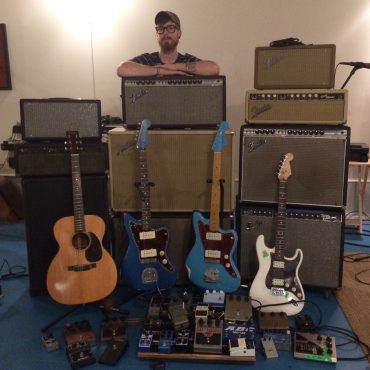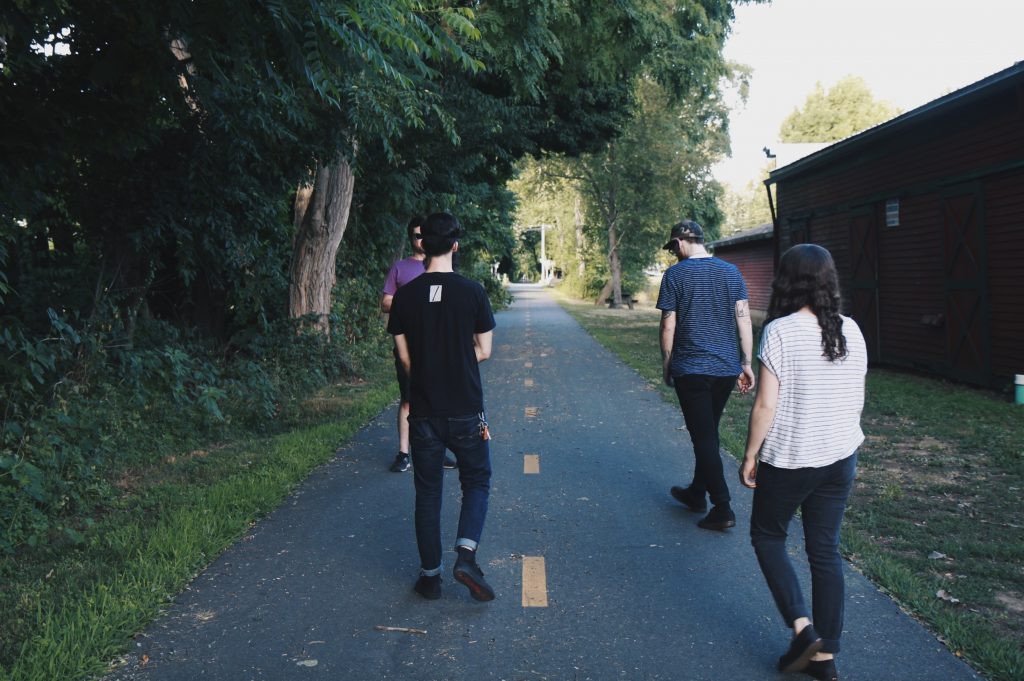To see Kindling in a basement or arts space is to inevitably contemplate how they could even contort a supermassive sound into such a small space.
It’s never a matter of band size or volume (although yes, you should bring earplugs); there’s arena-level ambition inside their punk-raised songwriting, a level of unease in their confidence that feels fully explained on Everywhere Else.
“The title came out of a conversation Stephen and I were having,” Williams recalls. “I was frustratedly, cynically proclaiming that we could leave here, but we’d just end up moving somewhere else that would become what we’re not liking about this area currently.”
“All these outposts [in Western Massachusetts] of progressive weirdness are becoming less weird, less progressive,” Pierce adds. “The exact line, I think, was ’everywhere is becoming everywhere else.”
Cobbling refined updates of songs from Spare Room, their subsequent Galaxies EP, and a few new songs to add to their running dialogue of restlessness, the quintet went into the studio to record Everywhere with revered Northampton producer Justin Pizzoferrato, who previously worked on albums for Pixies, Dinosaur Jr., Speedy Ortiz, and Sonic Youth, at his Sonelab studio.

Pierce at Sonelab courtesy of Kindling.
“One of my favorite parts about them is how they function like a punk band,” Pizzoferrato recalls. “ They came into the studio and banged out basic tracks in one fucking day. Andy Skelly told me he planned on doing [drums] all in a day and I thought he was crazy… he pulled it off effortlessly.”
Still, the brash pop punk edge of “Blinding Wave” and dive-bomb guitars of “Other Times” give way to more tender moments that would’ve never been imagined in a band like Ampere. The search for home builds to a roar midway through “Capitol Cities”, then snuff itself to a contemplative drone, whereas “Vegvísir” somehow manages to make feeling lost anthemic.
“A lot of the lyrics on Everywhere Else have a sense of a sense of escapism, kind of a holdover of that teenage alienation in punk rock,” Pierce explains. “We’re always wondering where is the place for us. Do we create it? Do we move towards it? They’re not questions we know the answer to.”
“It’s something we talk about a lot, the difference between finding a place on a map and that sense of discovery versus finding a place on some [clickbait-y] list,” Williams adds. “I think there’s still a restlessness in our lyrics and their delivery. It’s not like we’re floating away, which I like in bands, but restlessness fits us better.”
It’s also in that constant restlessness where it makes sense how Kindling defy the trappings of shoegaze revival or the expectations of a guitar-heavy band coming out of Northampton.
“They’re tight and fast and when you strip away the layers of guitars, reverb, and vocals, there’s a punk band underneath,” Pizzoferrato says. “The drums are fast and hit hard, the bass growls and goes between octaves quickly and, when you fade in copious amounts of guitar and vocal tracks, you have Kindling.”
We end the afternoon at The Quarters, an unassuming bar off of a back road in Hadley. Betraying its woodsy surroundings, the bar is a tribute to ‘80s arcades with a few modern flourishes; Pac-man lunch boxes on shelves mingle with flat screens and the bar is awash in the nostalgic neon light of games only a handful of us were old enough to experience firsthand.
Framing Kindling as a band under the same neon light of early ‘90s nostalgia wouldn’t have been too hard before this afternoon. Even their role on Everywhere as seasoned punks still wrestling the town they started out in isn’t a perfectly snug fit.
“There isn’t a cohesive sound out here,” Skelly says when pressed about Western Massachusetts from The Quarters’ patio. “It’s very relaxed with a lot of people doing a lot of things and it’s not in a busy, city-like context either.”
“I’ve heard some people describe it as fractured out here, which I sort of agree with,” Pierce adds. “There’s a lot of little scenes doing their own thing, which, yeah, it would be cool if there were more cross-pollination, but I think it speaks more to the area’s strength that we have all these little pockets without stepping on each other’s toes. It’s empowering, having all these little supportive scenes.”

If there’s any conclusive statement to make on Kindling’s behalf, it’s that they’re willing to keep proving a band with vocalists shrouded in reverb can still be crystal clear on their subversion of corruption and wrongs in the world. This past fall, the band released a cover of The Dicks’ “Hate The Police” with all proceeds going towards an organization working to create further legislation and vigilance against police brutality. The name of the organization could not be released, according to their Bandcamp, “because of the title of the song that we covered.”
“Even though people might not see us as an overtly political band or whatever that entails, it’s important to me to see ourselves as political because I don’t know what it would mean to not see ourselves as political in these times of inequality,” Williams says.
“It’s one of those big question marks, like ‘how can we as a band and as five individuals help?’ Giving money to an organization fighting this shit from that 7” felt like the very least we could do,” Pierce adds. “This great injustice surrounds us; it’s a normal part of our news cycle and it’s not a surprise anymore when these things happen. We want to be aware and part of that conversation, but respectfully so.”
In short, to press Kindling as shoegazers, guitar worshippers of Western Mass, or political punks is too convenient.
“There’s always been this urgency, this immediacy…” Pierce begins when asked to define Kindling.
“We just have a hard time doing things quietly or softly,” Skelly concludes mid-sentence.
Everywhere Else is out later this week on No Idea Records. For more information, check out No Idea’s website for vinyl, Disposable America’s website for tapes, and Kindling’s Bandcamp for digital.

